This site is called True Crime Rocket Science for a reason. True crime isn’t simple, or easy. Even experts [especially experts] and FBI agents with decades of experience can be totally out of their depth when it comes to a particular case.
The secret to understanding true crime is like true crime itself, simple – but not easy. It requires truckloads of time to become familiar with a case, with the case file and most important, to get to know the true face of the criminal and the victims involved.
As so often happens in true crime, this most important information – who the murderer really is – is carefully hidden from view or missing. It’s not there, it may not be visible, but it does exist. It takes a long, long time to carefully find those missing, concealed, covered up, manipulated and misleading distortions and know how and where these point away from reality.
True crime is like assembling an enormous puzzle made up of many tiny pieces. It takes a lot of time just to develop a cogent picture in one area, never mind the crime itself as a global whole.
The media, who like to rush in and with a snap of their fingers, reveal the secrets no one else can, treat true crime as a cash cow that one can approach lightly, apply one’s hand and voila, there’s the milk. And there’s the money. And the media think they have a foolproof formula for milking their cash cow: Send in the clowns experts!

Experts are often like journalists and reporters, they jump from cases to case like butterflies to the next flower. They nourish themselves by visiting as many flowers as they possibly can in a given day and they think this gives them expertise. I say it again – true crime is simple, but not easy. One develops mastery, and becomes a master – at anything – by devoting significant amounts of time and effort getting to know that thing. So by that token, those people who have immersed themselves for the longest time, consistently focused on only one case day by day are going to know the most about it. Who do you think qualifies according to these standards of expertise in the Chris Watts case?
Even detectives investigating crime and lawyers prosecuting them have to visit other flowers while doing their jobs. One of the few people who stick with a case from beginning through the middle right through to the bitter end is the narrator. This is why journalists covering a true crime case at the scene, in court, all the way to the verdict, are often the best sources. They know how it all ties to together and can intuit the subtleties. And if true crime is one thing it’s subtle.
This is why labels are so irksome in true crime. Labels are like giant rubber stamps, simplifying a crime and criminal psychology, and almost always OVERSIMPLYFYING it. And here’s a case in point from the reputable and reliable [?] Rolling Stone magazine.

I’m always interested to read about the psychology of crimes and criminals, because it’s typically the Undiscovered Country of true crime. Everyone asks about motive, everyone wants to know why, and yet often even with the benefit of dozens of investigators, cops, lawyers, even a court case going on for years, cases come and go and the why remains unanswered. It doesn’t have to be this way, but such a simple question requires a lot of work, a lot of effort, and a lot of the most difficult thing – thinking – to drill towards anything resembling a worthwhile answer.
Now let’s drill into this analysis into the imputed psychology of Chris Watts.

Apparently Watts “fits squarely” into the square psychology box for family annihilators. Actually, he doesn’t fit squarely at all. The article goes on to describe the typical traits leading up to a family annihilation: an inciting incident [such as a job loss], scenarios for long term strife in the home [wife’s infidelity] and/or a history of domestic violence. And most prototypical of all, the perpetrator tends to commit suicide after the act.
In effect the family annihilation exposes a family that is breaking a apart against the will of the perpetrator, and the sense of despair is so chronic and threadbare, there are clear signs of desperation and depression. The killing of the family is almost an attempt to preserve the family so the family can “be together” in the afterlife. In effect the perpetrator feels hopeless, wants to kill himself, but can’t bear the thought of his significant other and children being with someone else, and so he “takes them with him”.
It should be obvious that none of this is present in the Watts case. The inciting incident isn’t infidelity from the wife, but the perpetrator although one could argue Shan’ann’s pregnancy and her MLM work in general was the equivalent of a job loss, or a scenario that rendered his income null and void. Still, it’s not quite the same as losing one’s job and facing despair and hopelessness. If anything, Watts’ job was going well, and Shan’ann’s appeared to be going well. Strife at home isn’t completely absent, but if there’s one thing that stands about about the Watts case it’s the impression that they were a happy and perfect family. And far from Shan’ann being a victim of domestic violence, she wanted to stay married and wanted to make it work and wanted to fix things in spite of her suspicions.
The other aspect to note is that Watts wants his family to break apart, and wants a divorce, and wants another life with someone else. This is completely opposite and counter to the psychology of annihilators.

The impressive sounding Dr. N.G. Berrill [“a forensic psychologist and director of New York Forensics, a private consulting group in New York City”] is right that a family annihilation is “the culmination of a very bad situation that’s festered”, but before awarding Noddy badges for this brilliant insight we ought to remember that ALL CRIMES take place as a culmination of bad, festering situations.

Even a car accident isn’t accidental, but tends to happen at the end of a long period of recklessness, whether in terms of driving, or taking risks in terms of driving when drowsy. Far more car “accidents” are narrowly avoided, and people tend to learn and adapt from these near misses. So even car accidents at the end of a long road of festering un-roadworthiness.

Berrill’s references to patterns misogynistic behavior are also off, unless the references to Watts’ “animalistic sex” have some truth to them, which isn’t impossible. Watts’ clearly is on the more “repressed” side of Berrill’s continuum, but it’s a stretch to conflate Watts’ introversion and crushed-in personality with depression. If anything Watts had been happier than he’d ever been when he committed triple murder, and in addition to that in the shape of his life.

If that isn’t a disqualifier from the typical annihilator pattern – a deliriously happy Romeo – I’m not sure what is. There’s also no indication that Watts committed these crimes as part of a psychotic break [in the way Berrill implies], because a premeditated murder is by default a meticulously planned and executed crime. It’s the opposite of a psychotic break caused by trauma or despair.
Interestingly in Watts’ Second Confession, he seems to suggest exactly this, that his crime wasn’t premeditated and that it was a kind of psychotic break from reality.







When Watts says “if something like that happened” – well it DID happen. It’s not hypothetical although his fictional confession [for him] clearly is, just as the first was also hypothetical, and was presented to him by the investigators as a hypothesis.

Watts refers to this idea of “rage” many times in the Discovery Document. A filtered search shows 191 instances of the word “rage”, although many also include “garage” and “encourage”. In the 30+ page Second Confession report, there are just two references:


I’m sure Watts did feel anger and resentment, and his childhood and marriage, and introverted non-confrontational approach certainly provide fertile soil for some of those feelings. But does Watts strike one as the “enraged” type? Did he appear angry at any time when the cops were searching his home? How about during his Sermon on the Porch? During the hours and hours of his first two interviews and polygraph test, did he come across enraged then? When he was finally arrested did he appear irritated or flustered? When he appeared in court and was told what a monster he was, did he look up and glare at his accusers? After months in prison, does he appear angry or enraged now?
Did we see any traces of Watts’ rage in any of Shan’ann’s dozens of Live videos where he appears?
And in Watts’ version of events, when he murders Shan’ann and the children, does something trigger this rage? He has sex and makes up wih Shan’ann [supposedly] in one version, and in his spiel regarding the snuffing out of the children in the truck at CERVI 319 there is zero trigger.
Watts’ first confession, in contrast, is all about triggers. Shan’ann kills the kids and this sets off a rage in him. He tells Shan’ann he wants a divorce [in this version she doesn’t know about an affair], and this triggers her to kill the kids.



I don’t think rage is the operative emotion in the Watts case. It’s not irrelevant, because there was a long fuse effect [also referred to as the “slow burn” in the Oscar Pistorius trial]. I won’t say here what the operative emotions are, as I deal with them in the books. I doubt whether rage is the operative emotion in the typical annihilation either. There, even though I haven’t studied it as a category, I’d assume the operative emotion is despair. I say this because I suspect it’s similar to the operative emotion in mass shootings where the killers shoot themselves after making a huge statement. Once again in these scenarios, which I studied and profiled extensively in SLAUGHTER, while rage is present, the operative emotion which is even greater is despair, which is itself a function of massive humiliation and diminishment over a long period of time.
Back to the Rolling Stone “expert” psychological analysis. After describing the Watts case as fitting squarely into the pattern of family annihilator, the writer seems to readjust his view and describes Watts as “somewhat unique”. Ya think?

Then another expert weighs in, Dr. Neil Websdale, director of the Family Violence Institute at Northern Arizona. After Berrill puts Watts into the prototypical Family Annihilator Box, Websdale takes him out and puts him into the Narcissism Book, and closes the lid. This version of Watts is a self-centered, entitled, aggressive narcissist. And of course that’s who we see in all the Facebook videos. Watts taking center stage aggressively, and being entitled to his own paychecks throughout his marriage, and always only thinking about himself. Except…ahem…this isn’t an entirely accurate representation from the director of the Family Violence Institute. Besides the murders there is virtually zero family violence to speak of in the Watts case, so getting a Family Violence Institute expert on the show may appear to be good journalism, but it’s shockingly out of touch with the true crime merits of this case.

Steven Lambert, the Rzucek’s family lawyer is referenced next providing the insight that Shan’ann’s threat to fight for full custody is the real reason for the murders. Really? So Watts killed his wife first, and then having achieved custody, killed his children…?
Once again we have an extremely poor application of the facts of the case, but of course if it’s a lawyer or an expert it must true.
A good example of murder in order to “win” an actual custody dispute, where custody is a central motive took place just up the legal road in Colorado, in the Patrick Frazee murder of his fiance Kelsey Berreth. I want to deal with that case as a possible poster for the psychopath label.

In the Frazee case there was literally the bludgeoning to death in front of his daughter, and then the removal of the little girl from the scene, and then in the weeks following, a civil trial for custody playing out alongside the criminal trial for murder. That’s what a murder with a custody motive looks and feels like.

Before moving onto a proper comparison with Frazee, there’s a final aspect to deal with in this article about psychology from the so-called experts. Websdale signs off by describing intimate partner homicide as a weird sort of psychological enigma where anything can happen and nothing can be predicted. It’s all sort of random, you see. Websdale confidently notes that each time he’s asked about this issue he tells people there are no signs; you can’t predict it at all. That’s hogwash.
The same signs that were in play in the Scott Peterson case are in play in the Watts case, and for that matter, the Frazee case as well. There’s a period of standoffishness that precedes the crime. There is disenchantment, withdrawal and disinvestment. There’s an attempt to extricate one life from another that’s both explicit and tacit. If there’s loving behavior and consideration at one point, this pattern shifts noticeably towards its antithesis. We see the same thing with mass shooters and people who commit suicide. Any premeditated murder that goes on for any length of time is preceded by psychological and emotional preparation. It’s the cooling, the breaking of psychological and emotional attachments before the culling. And all of this plays out over again, like a movie clip set on repeat, in the soon-to-be murderer’s mind. Murder becomes a fantasy, but how that fantasy plays out in the real world is through real world disaffection with his intended target.
In the Watts case the signs were plentiful, from his sudden uncharacteristic lack of communication in general to his expressed fear and anxiety about having the third child as well as his resistance to announcing the gender reveal.
Besides this, the debt monster was a clear and present wolf howling at the front door, just as was the case in the murder of Laci Peterson.
So if we’re to conflate these cases with those of family annihilation, then we see unique signatures emerging from the ether: a pregnancy or newborn child, severe financial limits and an affair all providing an entirely different dynamic.
It may be better to refer to these kinds of crimes as Pregnancy Annihilation because at its center that is what it is, and probably how it starts. The murder is a dramatic way of enforcing an abortion in circumstances where the husband and father feels too inadequate [financially and otherwise] to broker or negotiate with his spouse the way a normal husband or father would. Murder, in effect, is the “easier” way out for them [because they’re cowards with weak social currency but strong/resilient connections to their own parents].
What Drives a Man to Kill His Own Family? Inside the Psychology of Family Annihilators – Rolling Stone

Now I want to address the biggest bugbear, for me, in this case. The only label more ridiculous for Watts than the Narcissist label is Psychopath. To understand why it’s such a misnomer, let’s look at what a truly psychopathic crime and criminal feels like.
Kelsey Berreth’s fiancée, Patrick Frazee, is a ‘monster,’ ex-girlfriend says – NBC

Without going into a lot of detail, we can see how the circled text doesn’t apply to Watts. He has empathy for his family right up until the time he kills them. He even has empathy for the investigators interrogating him, apologizing to them afterwards for lying.
Watts is also terrible at reading people, from his mistress [and her anticipated response to Shan’ann’s disappearance] to law enforcement to the media. His Sermon on the Porch is one of the least convincing misrepresentations to the media in the history of high profile true crime.
Watts thinks he’s clever, and a good liar, doesn’t he? He vastly overestimates himself on both counts, perhaps due to several years of MLM playing loudly in the background, with the Criticism and Fact Checking button permanently set to mute. But it would be overstating things to suggest Watts is a dummy in every respect.
Certain technical aspects of the crime were brilliantly executed, and plenty of evidence has been permanently lost, which is no mean feat in a “hastily executed flying-by-the-seat-of-his-pants” crime as some believe it to be. We still don’t have any independent proof for where the crimes took place in the home which is virtually unheard of in high-profile true crime.
Curiously the Scott Peterson case shares this idiosyncrasy with Watts – we can’t be sure where Laci was murdered or when either, but there is evidence plenty of bleach was used on the scene.
In the Amanda Knox case, there is less uncertainty about where the crime to place, but it appears there was a significant amount of cleaning up of the crime scene, and it appears bleach, household cleaners and doing the laundry suddenly became priorities that morning. In the Steven Avery case, bleach is also prominent, and evidence of the victim almost entirely absent.
There’s virtually no evidence Watts was emotionally abusive, to anyone, nor that he was cruel to animals. But if Watts doesn’t fit the profile of a psychopath, that doesn’t mean there aren’t a few psychopathic traits in Watts.
Like Frazee, Watts put his wife on a pedestal [and she did the same to him in some respects]. By doing this, the perpetrator idolizes his partner, which is the first step in distancing and disconnecting himself. Tearing down and burying is the final step.

Another aspect of Watts that conforms to the classic psychopath scenario is his “second face”, a secret identity hidden from the world which is nevertheless present. Scratch the surface, peel away the veneer, and there he is. But this trait is one true of almost everyone. On social media, and Facebook in particular, most avatars present a second, fictional face to who we really are. What this shows is a link between narcissism, psychopathy and social deception, and something else: as much as we believe Watts to be an alien monster that is nothing like us, he is very much a product of our time. He is us.

The 6-part TWO FACE series is available on Amazon at this link.
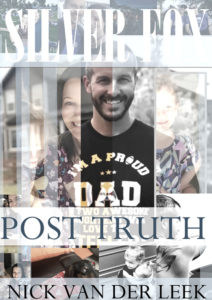
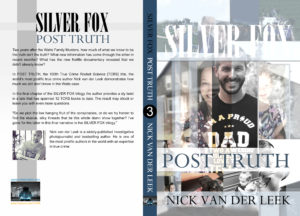
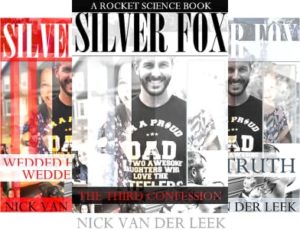


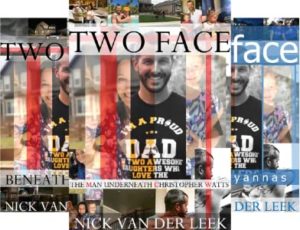

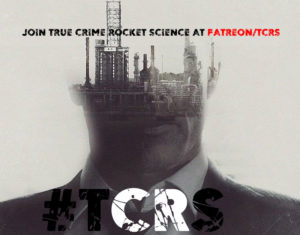

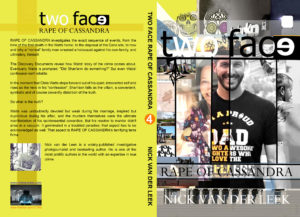
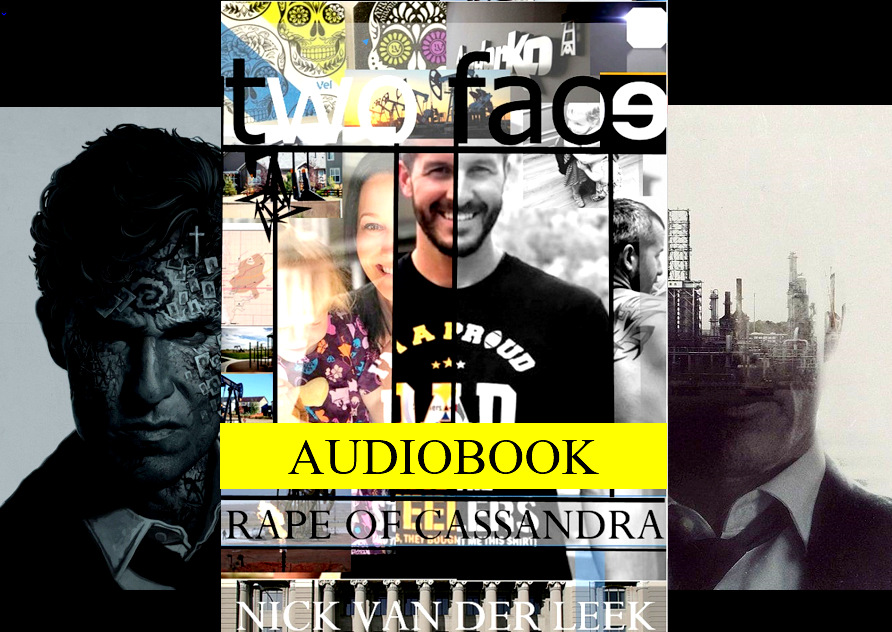
Very well stated. Watts has plenty of intelligence and is neither a family annihilator nor a classic sociopathic narcissist, nor some miswired monster. The DA calling him a monster is infantile but he’s throwing bones to the public.
He misreads people as many of us do, especially when we are wrapped up in our own agenda. Shannan certainly had misread him.
He is a liar under certain circumstances as plenty of people are, and the crime certainly was an act of desperation in many aspects brought on by the long fuse effect and the projection of his true self and true life onto Nichol.
Sociologically he’s a product of our times in many aspects ( images of perfection, rampant consumerism –if not on his part then on Shannan’s –played a central role in the crime). I think what he did was horrendous but I do empathize with him.
If there were real family wealth (say his parents had inherited real wealth and properties to share with him) he would simply have divorced and still doted on his children.
CW most certainly is a family annihilator. They are only able to be identified by what they do, which is murder their family members. Since CW did this, he is a family annihilator. By definition.
I’ve said it before – if CW and SW had won a multi-million dollar lottery the week before the murders, there would never have been any murders.
But as Nick pointed out, family annihllators have a history of job loss and domestic violence, fear often that the wife is leaving them, and commit suicide at the crime scene. CW was the exact opposite profile. His job was going well, he had zero history of violence, he wanted out while Shannan was begging him to stay, and he had no plans of suicide: he tried to get away with his crime.
I think the problem here is that the investigators want to set up a neat little box where all the family annihilators fit into, and that doesn’t work.
We’ve had people come on here and insist that, since CW murdered his family, he must have been abusive to SW and the children the whole way through. Because being an abusive jerk sometimes ends with murder, or at least fits better with the personality/behavior that can be reconciled with murder. But that’s not the case at all with CW. And this goes for all the other family annihilator characteristics that don’t fit CW, such as killing himself at the end. There are plenty of cases of acrimonious divorce where the father murders the children during his visitation just to “get back at” the ex-wife.
So in my mind what we’ve got here is equal parts “murder is the most frequent cause of death for pregnant women” and “gotta get rid of the wife and fetus but can’t do that without getting rid of the girls as well”. CW’s initial ruse was to make it seem that SW had taken the kids and disappeared, however strange and out of character, unbelievable really, that scenario would be given who SW had demonstrated herself to be. And if SW had chosen to disappear with the kids, then CW was off the hook forever (or until they came back) and free to be single and start a new life with his love NK. However that would eventually play out, by “disappearing” his family, CW has met NK’s bottom-line requirement that she, NK, be first in his life.
And that’s not her fault – it’s perfectly normal for someone who’s looking at a first marriage to want to share that and all the milestones with their partner instead of having to step into someone else’s life midstream, after all these “firsts” have been taken, claimed by someone else.
Well put. I always kept open the possibility, however unlikely given evidence, that CW wanted Shan’ann to know the children were dead and gone before taking her life. Although it would be the most terrifyingly cruel scenario, it would place him squarely within the profile of family annihilator.
I did – I empathized with him initially. Thought he was emotionally abused by his wife. I thought he was somehow this great guy who came into a marriage full of hope for the future and building a life with his wife but then children, money troubles, her MLM fixation, just sort of shoved him out of the picture – and although he pretended to go along, he really felt beaten down inside. I see him a little differently now. He has a victim mentality. It’s always someone else’s fault. But his racket on top of that is to remain affable and calm in spite of all that is put upon him. His original feelings of being victimized are what drives him to put together his racket to survive. The victimization is all in his head to begin with. So he goes passively along, letting others take the helm, knowing secretly that he’s being put upon. It’s a false assumption to begin with. It’s likely he never really thought about having children. It was her idea. She plans to have them, then plants little surprises for him to find out and he implements his racket “that’s awesome” “really?” “that’s what happens when you want something” – he doesn’t want it – he doesn’t not want it. It all just happens to him, and he can absolve himself of being responsible for it and at the same time sort of observe it as if it’s all happening to someone else who should care. He watches it all happen.
Shy, introverted Chris. He has to be picked in life – because he also must go along. Then he can be a victim of how he’s being managed. His new theory about himself began in June when he found someone else. Now he can change because he feels more in charge but really he just pasted his old self onto a new relationship because even now in his Confession 2.0 she pursued him, she wanted sex all of the time, he had to talk her down off the ledge several times, she got angry when he left her house July 4.
He still can’t take any responsibility for the reason he killed his children. Or his wife. Something just came over him. He’s still being a victim and he has no empathy for the destruction he’s caused to the Rzucek’s. And to his own family, however they are not showing any empathy either – and this is how he grew up, not showing empathy or taking responsibility for his own feelings and thoughts and being a victim.
He does not fit the family annihilator mold, but he fits the societal mold of those in life who cannot take responsibility for how their lives turned out. “I’m this way because.” Lawyers build their careers on just such a defense.
Meant to send that post as a reply to you, sorry.
Great analogy, Sylvester!
Sylvester, Great post!
Adding to the great commentary here that it can be frustrating and exhausting to be in a marriage with a partner who won’t speak about their true feelings, needs, wants, opinions etc. After awile the go along to get along attitude wears on you. Your left either guessing about what you think your partner wants or trying to coax it out of them. Calling all the shots and making all the decisions for the partnership can be a heavy load. It is also the other who bears the blame and responsibiity when things go wrong. Chris was fine delegating it all to Shanann until he wasn’t. Then when he wasn’t he didn’t even bother to try to work it out with her and deal with his issues around self esteem, being asservative, communicating etc. he just jumped into a relationship with another woman. His relationship with NK would not have been better in fact, I predict he would have gotten much more than he ever bargained for with her. The problem is within Chris and until he dealt with his own issues he would not find lasting happiness in a relationship by stuffing his feelings, ignoring his needs and denying himself.
I couldn’t agree more Sylvester.
Sylvester you, my friend, nailed it!
Excellent view. I think it encapsulates Watts perfectly. He is also a narcissist IMO, because his “image” is all important to him. I’m still floored by his response to interrogators when they asked him if he wanted his co-workers to go to Cervi-319 to retrieve his children. I feel absolutely no sympathy for him as some others do as I feel he has no soul.
I don’t believe he’s a narcissist, especially when his wife showed more narcissistic tendencies than he did; Either way I think it’s important to not label anyone in this case. I understand the need for some people to do so – If they can fit CW in a neat little category like “narcissist”, “family annihilator” and so on and in doing so box him in, then it makes it less frightening than if we admit he was just your average Joe. If he’s a monster, then we don’t have to empathize or sympathize with him or look deeper into his actions. “He’s a monster and that’s what monsters do”. Labeling him is easier than looking beyond the surface and we can tell ourselves that this would never happen to us, especially because our brother/son/ father/significant other isn’t a family annihilator, a narcissist, a monster like Chris Watts is. On the other hand, if we tell ourselves he was just your average guy until these events occurred, then it becomes frightening again. Could this happen to me? Is my husband/brother/dad/SO capable of something like this if another seemingly “normal” person committed acts like this? Are we?
It’s easier to disregard someones unfavorable traits and thus easier to distance ourselves from them (and their actions) if we’re able to compartmentalize their actions and lump it into an identifier. Psychopath, Sociopath, Covert Narcissist – whatever, doesn’t matter; What matters is that “I’m nothing like that, so this could never happen to me”. It’s when all those labels are absent from the equation that we’re forced to dig deeper and look at the situation from a different standpoint/view, and in doing so we may find out we’re more like this person than we originally thought. Maybe we’re not so different after all, and sometimes that brings a feeling of unease with it.
Im not directing this at you, I hope it doesn’t come off this way. It’s just something I noticed while examining my own self while learning about this case. Before I knew it, I found myself trying to find a category to fit CW and SW into and I had to step back and ask myself “Why?”. Why was I trying to fit these people squarely into one category when infact, like most, they fit into a little bit of everything (instead of hitting all the bullet points on just one). Then it hit me. I was doing this so I could tell myself “I’m nothing like that” and therefore I wouldn’t have to sympathize/empathize with anyone, or examine in myself why I have such a visceral attraction to this case. I could distance myself. What I love so much about this blog is that Nick forced you to examine not just the case, but human behavior on a different level. There’s more facts than fluff, even if those facts don’t always paint certain people in the best light. He doesn’t play favorites and examines the case from a neutral standpoint which is harder to do than most realize. His way of approaching things has certainly broadened my view and made me take a step back to examine to things in a different light, not just in true crime but in my own life as well.
Some excellent points. In the main I agree.
However I do feel he became introverted and passive in childhood due to his natural nature combined with faulty nurture. In adulthood things seemed too fixed to change them.
I think the motivation in his interview was to tell a story that completely takes out the planning even if the way he did it is worse than anyone thought, it’s still better than having planned it. He does slip up, first straddles her while she’s facing him but then is haunted by what she saw in his face when she looked back at him. Looking back says catching her unexpectedly and naturally you would try to look back to see who’s doing it. That catching her by surprise doesn’t fit the rage story so she was on her back threatening him with custody.
The two statements that surprised me and probably people who believe shanann brought this on was that he said he never felt belittled by her, if true, it may sound like belittling to us but to him who had a relationship with her he didn’t take it as belittling, it was shananns ways. The other one was if true that he would have said he had a good marriage before he met NK. Hard to know if those are true because by saying that he also downplays that it could have been planned. We had a good marriage, I didn’t feel belittled. Why would I have planned it. He doesn’t even mention that money was hemorrhaging out of that house, didn’t bother him, nope, not a factor so no planning.
The other annihilators in recent memory, Chris Coleman, Chris Longo, Scott Peterson had preplanning. Chris Benoit’s was rage, Chris watts fits the first three but wants to be the Chris Benoit killer, (thought to have been steroid connected) but “snapped”. The narcissist diagnosis has been used by I think every so called expert in analyzing the crime, but as you said, it does not fit Chris watts
Makes me wonder if the “narcissist” category really fits anyone. What I don’t understand is why his new version makes him sound any better.
Agree Sylvester. The label “narcissist” is being thrown out so much, its losing its meaning. Appears everyone’s a psychiatrist and everyone’s a narcissist.
2.0 version of events, while creative, was strange. I had to listen to it without trying to glean any “truth”. Admire the investigators surprise return for another shot at his slippery reality. It sounded like he was getting theories and updates from his fan mail. Like Lee’s initial seed, did Sha’nann do anything.
Anticipating many versions in the future.
He will continue to update versions based on public reaction. He desperately needs people to like him. That’s all he has left now.
I have no empathy for any parent who murders his children.
“I have no empathy for any parent who murders his children.”
No one is asking for that, you’ll notice.
Ralph Oscar. I never said anyone was. No need for snarky attitude.
I think he had to cover everything without bringing premeditation into it. He killed the girls at Cervi because the DA had bought into the YouTube shadows theory. The only things I can’t understand is the embellishment of details such as the girls resting their feet on dead Shannon and Bella crying “Daddy, no!”
The embellishment bugs me too. However, it’s possible that Watts read or heard somewhere that adding detail to a lie makes it more believable. This has been suggested plenty of times on plenty of platforms as a way to be believable when lying. However, it’s interesting how he adds in these very specific nuanced details, and at the same time, skips over important spaces of time, adding no detail at all. For example, what were Bella and Cee Cee doing when he was backing in his truck? I wonder if this pattern of detail (or lack thereof) in storytelling speaks to one’s level of truthfulness.
Interesting insights. Explains a lot. He certainly made it more painful for Shannan’s family. As for your last sentences, these aspects were perhaps too boring for CW to embellish.
I don’t know why this post is impacting me on such a deep emotional level, but it is – your last 2 sentences, the last paragraph, are a sum of the ultimate truth. I feel a inexplicable sorrow as I finish reading, and I’m strangely aware now of being able to let go of the “family annihilator” label. Broadly speaking, he fits the definition but it’s not what he “is”. The crime is unique in this sense. If I’d never seen anything past the sermon on the porch, like so many others,I may have been blindly ignorant to the fact that he’s not categorically a narcissist or a psychopath. When I looked further, I knew he wasn’t. You are the first writer I came across that said it out loud, and with unwavering conviction. It was truth among the usual chatter and noise.
My first thought (after wiping my eyes) was that you should consider sending this piece, or something similar, to the Denver Post as a guest opinion writer. I know the Longmont Observer, with readers locally to the crime, would be thrilled to offer this insight to its readers But perhaps you should think bigger than that. I’d expect some opinionated blow back, but that’s to be expected when you challenge people to think. I hope you consider it.
As the American clergyman William Sloane Coffin put it: “Nothing is easier than to denounce the evildoer, and nothing is more difficult than to understand him.”
Perfect quote for me personally today, Ralph Oscar. Both thumbs up!
I ran across that and I just knew I had to bring it here. It’s our catechism!
I love that! Fits perfectly.
There are several things that stood out significantly to me in this newest interview with Chris Watts and I will admit I didn’t take notes, they are just thoughts that I picked up on that have continued to swirl around in my mind…it’s also a bit of a disclaimer for any recall not exactly verbatim.
Near the end of the interview, CW states that he has always had a crazy imagination and gives an example going far back into his childhood. He’s a person who lives in his head, credits himself with a very high IQ, an amazing memory, and then goes on to regurgitate much of what has been cited as speculation online as his new truth, forgetting details as he goes along because of the psychosis he’s supposedly under. A man with an amazing recall for details…forgetting details. A lot of them. But he does offer speculation to the detective and agents why he might be forgetting those details…
The first time he begins to discuss putting Shan’ann’s body into his truck and he’s asked about the children, he doesn’t want to talk about it. There seems to be genuine distress in his voice when saying he doesn’t want to go there or can’t talk about it, yet they get him talking about it moments later. He’s more composed. Storytelling perhaps…
He mentions Bella following him and never touching Shan’ann to try to rouse her but no one seems to think it important to ask what happens during the time he goes to get his truck to back it into the driveway. Does he do this before he carries/drags Shan’ann downstairs or after? Where is Bella? Is she just standing there staring at the wrapped body of her mother?! You know, where her foot came out of the sheet to thump against the stairs…
He’s able to calmly get both children into his truck with no fussing, no tantrums, no distress, just like it was any other day that Daddy takes them to work with him, with their mother in the back lying on the floorboards because she doesn’t feel good. Wait, Daddy has never taken them to work with him, never takes them anywhere in his truck, Mommy never lies upon the floorboards wrapped up in a sheet in all those times she hasn’t felt well…
The amazing grace he’s claiming is his closer relationship to God and his ability to tell the truth now is allegedly a result of this newfound relationship, yet this truth is supposedly the same story he told his lawyers just two weeks after his first confession. Before finding God…
It seems that the truth according to Chris Watts is the admission of the main acts while keeping any what he considers inconsequential information and details to himself. All anybody needs to know is that he admitted to the crime. He killed his wife. He killed his children. How and why is nobody’s business but his. And that’s the truth…according to Chris Watts.
Very great SRC! And if I might add – I don’t think he regrets doing away with his family at all. And what he wants now is to be able to talk to his mistress. I suppose the agents could have used that as bait, and not delivered.
This video does a good job of analyzing the psychology of the Chris Watts interview.
https://youtu.be/sid7bvGupOk
She is very good, enjoy her youtube channel.
Thank you for posting, Tracey. The biggest takeaway for me from this video was the explanation she offered for why CW said he was apt to be more nervous around Shan’ann and careful about what he said, but was free to be more natural and himself around NK…and it wasn’t such a flattering reason for NK.
I haven’t listened to much of her coverage, but from what I have heard she’s a huge fan of the narcissism label, and the title of her account – Live Abuse Free – isn’t relevant to this case. Chris Watts wasn’t an abuser, and his murder of his wife and children wasn’t abuse, it was a crime.
She’s definitely a label labeling labeler yet in her process of doing so, she manages to offer glimpses of insight worthy of some thought. Whether it’s dismissive because it is said with the intent to support a particular label is certainly debatable.
In her description alone I think she mentions the word “narcissist” four or five times, and sociopath once.
I find it difficult to believe you can find value in the coverage here if you’re going down the yellow brick labeling road.
I listened to her briefly talking about Watts in jail in Weld County where the inmates were telling him to commit suicide. She says, “He’s not getting his narcissistic supply…and that’s what narcissists need…the worst thing is shame…”
So I wonder in what universe a normal person being yelled at to commit suicide would feel any different? You at home in your marriage or wherever you are, being screamed at on a daily basis to commit suicide…would you describe that as you not getting your narcissistic supply? And if you killed someone, would that then qualify as you not getting a narcissistic supply?
If you have a hammer in your hand, soon everything becomes a nail.
Narcissism can be used to explain virtually everything, but the neat thing is, it doesn’t really explain anything, it’s just a label. And it’s extremely misleading and misapplied here, because of all the individuals in this story I would argue Watts is the *least* narcissistic. The argument is made that Watts’ introversion hides a self-absorbed, selfish egotist. He was so selfish he gave his paycheck to his wife every month and so had no money to conduct an affair.
Narcissism by its very nature is about putting oneself first, preservation, me at the expense of all else. So why would Watts as the prototypical narcissist cave in on himself, completely forego a defense, take a plea deal and talk for hours self deprecatingly about himself – admitting his crimes – to the cops? Since Watts conforms to the label, please show me another example of a narcissist who wants to talk at length about his mistakes, doesn’t want to go to court and defend himself but would prefer to admit his crimes and diminish himself, and continue to pay the price for them.
I’m guessing those throwing the labels around are arguing that he’s the most narcissistic character in this story. Is that what you think?
Nick, I agree and don’t find much value in using labels. What I find interesting in this video is her analysis of the things he said during the interview and why he may have said them. Especially the discussion about NK, religion and moral judgement.
Tracey, those were the nuggets I was referring to as well. She had a few interesting thoughts about those. Points to ponder for debate.
No. I’d often roll my eyes at each mention of “covert narcissist” and “narcissistic supply.” Yet each time I found myself being dismissive, I’d try to keep an open mind to think if there was any value in what she had to say. When I did that, there would be tiny nuggets of information that would sift out of the nonsense that I would reflect upon.
I’m a voracious reader and find value in a variety of resources. I rarely watch anything, but if I do take the time to do so, I want to find some meaning in it rather than chalking it up to a waste of my time.
I look at him as Chris Watts; unique unto himself yet someone I can relate to through our mutual existence. Any word or label I apply to him has been filtered through my own thoughts or experiences…they are not separate in the sense that I use them, even in my own mind, to separate myself from him. I learn from him. I learn from you. I learn about myself from him. I learn about myself from you.
Narcissist wasn’t even part of my thought processes as I think it’s a useless label in advancing the understanding of anyone as it is a part of everyone. It’s when I find myself becoming dismissive that I stop to pay attention. Sometimes it’s warrented, sometimes it’s when I learn the most.
(Hope that made sense!)
I think that falls into that category we’ve seen, where someone will insist that CW was abusive and violent their entire marriage, because don’t you have to be habitually abusive and violent to end up murdering your spouse and kids? No, as we learned with the CW case. If the model (theory) doesn’t fit the facts, you have to change the model to fit the facts. Otherwise, it’s useless.
Too many people seem to believe that it’s what they think about themselves inside their minds that determines what kind of person they are. They believe they’re nice people, so when they do *this* or *that* nasty thing, oh, well, that doesn’t count – that’s just a one-off. Or, in the case of CW’s murders, a three-off. The reality is that it is what people do that defines them, and CW doesn’t seem to get this. He thinks of himself as a nice guy, and that was just this “episode” or whatever where things went profoundly pear-shaped. He’s still the same nice guy he’s always been, in his own mind.
I think that’s one of the reasons it’s so surreal seeing CW and listening to him. It kind of sounds like he’s distanced himself from those all-important events, as if the Chris who was doing that wasn’t really him – like he was in some sort of fugue state, in his memory as if it was a movie he was watching (starring himself) rather than something he actually did. Like it was this kind of irresistible urge that drew him down that dark path and no way he could turn away – it took him over and, thus, it’s not his fault, not his responsibility. It’s the fault of something else that he had no control over. It’s no surprise that people say “The Devil made me do it” – I’m sure that’s how it feels, like it was some sort of external force – external in the “not-me” sense. And looking back, it doesn’t fit that internal self-image of himself, so he can’t own it.
I find this woman very charming and have watched her coverage of Watts, but it’s good to recognize that her degrees in Psychology and Counseling don’t adequately equip her to diagnose disorders. She struggles IMO to connect Chris’ behavior to “his need for N supply”. She had a really good arsenal of behaviors to use when she discussed Cindy Watts though.
I saw this case study on Person A(Shan’ann) and Person B(Watts). A clinical psychologist also weighs in with their professional opinion in the comments.. Shan’ann displayed 8 of 8 (6 of 8 in my unqualified opinion) markers for Histionic PD and Chris displays 3 or 4 of 8 markers for Dependency PD. Interestingly, NPD is all but ruled out for both of them although it’s a co-occurring possibility with HPD.. This is just another way that the psychology of the Watts can be interpreted from afar, but it was helpful for me in seeing the broader scope from a clinical standpoint. It’s certainly not to be considered a diagnosis but I hope others find it helpful too.
https://old.reddit.com/r/ShannanWatts/comments/adxvbx/an_academic_case_study/
I think all those folks who love the narcissist label need to stand up and put a label on themselves, and be prepared to be branded [saddled] with that label permanently. Are you an alcoholic or a cheat, a liar or a thief, a hypocrite or a coward, an addict or a procrastinator, a victim or a manipulator? If so admit it and wear it like a badge, because maybe that’s who you are and all you are.
Isn’t it?
Most people – even cardboard cutout superheroes – are a little more complex than a single label, but I get how masses of people love to oversimplify the complexities of human nature by putting it all in a nice little box, and holding it up for all to see under the banner of expertise.
Precisely, thanks. To quote a friend, “People with a degree in Psychology think they know everything. It’s not until you get your PhD that you realize you know nothing.” I don’t know if she tells her patients this, but I think her point is that human nature is much too complex to box people in with a label of any sort. Everything and everyone is on a spectrum somewhere.
I so agree. I do put stock in Psychiatrists and Psychologists who are trained (with phD’s in Clinical psychology, with a medical degree as well) in being able to properly diagnose a patient – or submit the prisoner to a battery of tests – MMPI and MMPI2 come to mind – but those test results are not leaked to the public, and are likely to be suppressed under Hipaa law (which might be what Watt’s attorney’s were seeking to suppress, had he gone to trial). But cookie cutter analysis, although interesting, does not address the criminal mind or the individual. We are not all one thing or another anyway. Just as I don’t think Cindy and Ron Watts “made” Watts one way or another. Many children are shuttled off to babysitters from age 5 to 10 and turned out fine (at least I think I turned out fine). Watts had his grandmother every day after school – he was cared for.
Nick, JC, and Sylvester, this is an over-simplification to your thoughtful posts but I agree with each of you. Enough of my over-posting for today; I appreciate “listening” to the conversation.
This is one of the problems I have with AA. Yes, I attended some meetings a few decades ago I’ll say right out front. People introduce themselves with “Hi, my name is __________ and I’m an alcoholic” . I refused to say it because words have consequences. Also I was a social drinker who overdid it. Did that make me an alcoholic? I didn’t feel that branding myself with that label would serve me or empower me in any way. I know AA does good work – it’s an amazing support system for those who want to never touch a drop again, but it’s a flawed system in many ways because the premise is it’s a disease, and if you allow a drop to touch your lips you are “powerless” to stop. It’s a choice. I made a decision 7 years ago that I had no use for alcohol, my behavior under the influence was unattractive, and I didn’t want close family members to worry about me nor did I want to have a drunk slurry conversation stand as a model for anyone else. Once I said good bye to alcohol, I noticed that it had always taken two drinks to erase the awful feeling of one, and that I no longer liked the taste. That was a huge breakthrough. Because often people say they miss the taste. I do not. So just a share about myself and the refusal to give myself a label as it’s non productive, doesn’t work, and isn’t empowering.
Thanks for sharing Sylvester. They key solution for people suffering from obesity, or drug addiction, or smoking, is the way they attach their identities to their addictions. In other words, the problem is they had adopted a label as their identity. Ironically this is also the solution. For an obese person to find their way back to fitness, they need to break their self-identifying self talk of “I am fat”. A drug addict has to believe he or she is sufficient and can exist without a drug [“I am enough as I am”]. And a smoker has to evolve their psychology beyond “I’m a smoker and I’m trying to quit” to “I’m not a smoker, I’m better than that.” Labels are incredibly self-limiting, and in true crime, people think they have a pass to pigeon hole criminals just as they do others and themselves. Not on my watch. Who we are exists on a spectrum. We may be more of one aspect than another, but all of us are capable of moving ourselves along that spectrum, for the better or worse.
I know this is a little off topic, but does anyone know if Shanann was looking at the baby monitor on her phone as she walked up to the house? She had her phone on in her left hand as she walked up but I can’t make out what’s on it
The older baby monitors they had did not support phone access.
I wish the DA would give an explanation as to what he says really happened now as opposed to him saying watts could clearly be seen going in and out of garage three times taking the bodies out. If he is sold on the shadow and the girls were alive where’s the evidence of the other girl walking out or of her being hoisted into the truck. I watched it over and over since he said this was truthful and I don’t see any other shadow, no sign of Chris lifting another child into the truck. Maybe there’s editing, but I can’t find any evidence in that video, nothing but Chris’s recounting that both were alive